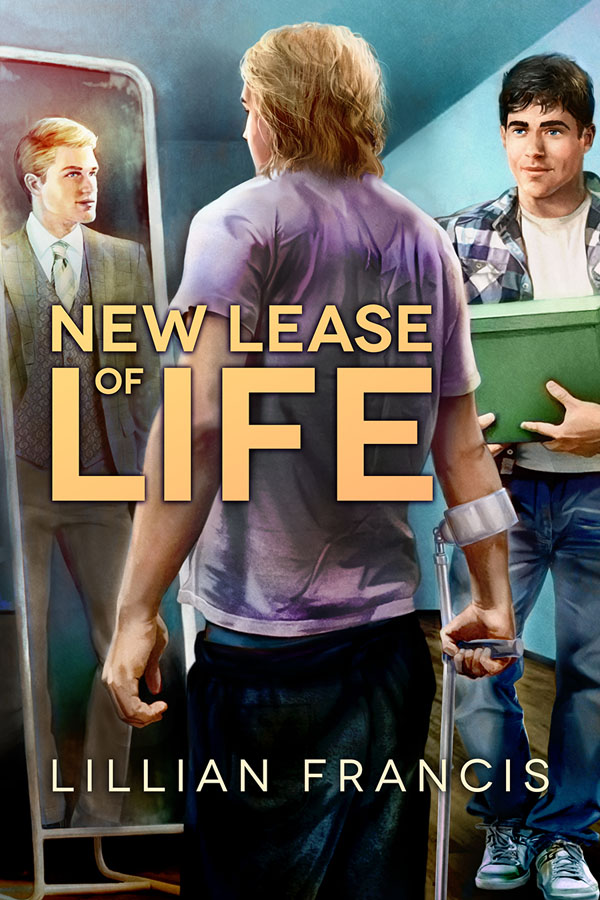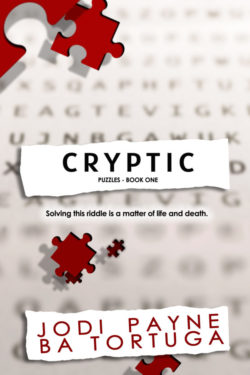by
Phillip used to laugh a lot, back when his friends called him Pip. However the good deed that left him hospitalised not only marred his body, it stripped him of his good humour too. Ever since, he has pushed his friends away and shut out the world. Donating his vintage clothing to a charity shop should have been the final act in a year-long campaign to sever the links with the man Pip used to be, but the stranger on his doorstep awakens feelings in Pip that he hasn’t experienced since the incident that left him angry at the world and reliant on the cold metal of the hideous hospital-issue crutch.
Colby forces his way into Pip’s life, picking at the scab of his past. Colby isn’t interested in Pip’s money or his expensive address. He has only one goal: to make Pip smile again. With every moment in Pip’s presence, Colby chips away at the walls Pip has built around himself.
Pip knows it’s impossible to fight his attraction with Colby’s sunny disposition casting light into the darkness in his soul.
- 4 To Be Read lists
Publisher: Finally Love Press
Cover Artists:
Genres:
Pairings: M-M
Heat Level: 3
Romantic Content: 4
Ending: Click here to reveal
Character Identities: Gay
Protagonist 1 Age: 26-35
Protagonist 2 Age: 26-35
Tropes: Big Character / Little Character, Class Differences, Hurt / Comfort
Word Count: 73500
Setting: London
Languages Available: English
Chapter One
“YOU HAVE reached your destination.”
“Maybe I have,” Colby snapped at the nasal voice of the satnav, “but there’s no bloody space to park.”
On-street parking in London. The bane of his existence.
Always had been. Even back in the day when he’d been visiting clients. From A- to Z-listers, regardless of their letter, they all desired a swanky London postcode and a personal trainer while their star shone. And none of them thought to provide said personal trainer a parking space or a permit. That’s why, in his own fifteen minutes of fame—that had left him with a cool million in the bank and comparative anonymity from the masses at large—Colby had purchased a detached house in one of the leafier London suburbs with a garage and a rather large driveway.
“Turn around when possible.”
“Fuck off,” Colby grumbled at the machine. “Do you think I’m stupid?”
READ MOREHe leaned forward and fumbled for the power switch, cutting off the voice before he felt compelled to issue his own set of implausible instructions about orifices and where things could be stuffed.
An amber flash attracted his attention, and he slowed, earning an angry prolonged toot from the car behind him. Pulling up and putting on his hazard lights, he waited for the car that was indicating to vacate the space and then quickly slipped his Fiat 500 into the gap. Number one rule of parking in London: if you snooze you lose.
Rule number two was to always carry plenty of change for the parking meter. One hour should be enough, but paying out for two was preferable to getting a yellow boot. He didn’t have the time or the inclination to deal with clampers on any day of the week. They killed his mojo and were one of the few things—along with the voice of his satnav—to seriously piss him off.
Having paid what felt like enough to rent a small country rather than a patch of asphalt only just large enough for his very compact car, Colby thumbed the locking button on his key fob and started back down the road.
He jogged a couple of hundred yards, aware that he was already several minutes late for his appointment, and kept an eye on the house numbers as he passed. The houses here had no front gardens; instead a wide set of grand-looking steps separated their large front doors from the pavement.
Many of the four-story houses had been converted into two apartments—there was no way they could be referred to as flats with all the negative connotations that word conjured up in Colby’s mind—with the door to the downstairs abode being the old tradesmen’s entrance. From other similar homes he had been in over the years, Colby guessed that whatever the lower apartment lost in curb appeal, it more than made up for in space, since the upstairs apartment no doubt incorporated the boxy attic rooms.
Regardless, these properties would sell well into six figures. That meant the inhabitants had money and were well-off or well-to-do. Either way it had Colby’s spider sense tingling. Designer or vintage. Maybe a bit of both. He could be in for a good haul today.
He slowed as he reached the twenties and pulled out his phone to check the number. 25b. A downstairs apartment, according to the way the rest of the street had been numbered. Covering the last few feet at a walk allowed Colby the time he needed to calm his hurried demeanor. With his agitation—at London traffic in general and the possibility of being late in particular—quelled, he came to a stop at the wide stone steps of number 25. As he suspected the overbearing front door declared it belonged to 25a in bold, polished brass. His appointment was downstairs, then.
A stretch of quality railings, all curled and shaped ironwork, separated the stairway to the lower level from the pavement. Colby made his way to the gap and then paused at the top of the stairs that led down to the lower doorway. The double handrail that guided the wary traveler down the stairs was unusual for such a property. Although the metalwork was sympathetic to the high quality of the railings, it was undoubtedly a newer edition.
Colby scuffed the sole of his suede lace ups—smart shoe for a posh address but casual enough not to clash with his outfit—over the surface of the top step. The banister had probably been added when the stone steps received the antislip surface on the treads. Not just a strip either but full coverage. Despite the fact that he would normally skip easily down the stairs, Colby found himself using the handrail and treading carefully, as though heeding the warning the steps themselves had issued. The amendments to the property implied an old and infirm resident, and Colby braced himself to be greeted by a grieving relative.
Another set of brass digits proclaimed his journey’s end. He pressed the doorbell, noting that both the bell ringer and the numbers lacked the shine and polish of the house above. Inside, the bell chimed his arrival in dulcet and welcoming tones—no crass electronic buzzer or, worse, tinny music to mar the quality of the property—and he half expected the door to be opened by a butler in his best bib and tucker. Mindful of that thought, he smoothed a hand down the front of his button-up plaid shirt and then checked that the back of his shirt was still tucked into the waistband of his russet colored chinos.
But, despite checking his appearance, no butler appeared to chase off the hoi polloi. In fact, no one came to the door. Colby checked his watch—he wasn’t that late, a couple of minutes at most—and pressed the doorbell again.
As the second chime faded away, Colby heard an odd thudsqueakcurse, thudsqueakcurse, thudsqueakcurse that got progressively louder the longer he stood poised with his finger still hovering near the bell press. Dropping his hand back to his side, Colby leaned closer to the door, hoping to make out the individual sounds, but they were muffled by the thick wood.
“You only need to press the bell once,” said the angry young man whose face appeared in the gap as the door was opened. “I should get a plaque saying ‘Cripple lives here. Be patient.’” This last part appeared to be muttered more to himself before he returned his brusque attention back to Colby. “What d’you want?”
“Mr. Longhampton?” Colby addressed the disembodied head, since it became apparent the door wasn’t going to be opened fully until he’d introduced himself, if at all. “I’m Colby from New Lease of Life. You phoned about a clothing donation for my shop.”
“Oh.” The man’s expression—Colby still wasn’t certain he was talking to Mr. Longhampton—darkened even further, and he disappeared for a moment before the door was opened to allow him entrance. “You’re late.”
“My apologies,” Colby said with a smile purported to turn little old ladies into simpering girls and quell the cries of a baby. “I struggled to find a parking space.”
Obviously Colby’s smile didn’t work on grumpy posh bastards since a snort was his only response, and they still moved no farther into the house.
Uncertain of how to proceed with the prickly man in front of him, Colby asked, although it was more a suggestion than a question, “If you could just show me the items you want to donate.”
“Clothes.” The man sighed, suddenly saddened.
Grief worked in mysterious ways, but Colby had never seen anything quite like this before. “You are Mr. Longhampton?”
“No, I’m a bloody squatter.”
Stunned by the strength of the man’s ire, Colby took an involuntary step back.
With a sharp exhale, his host shook his head. “Sorry. Of course I am. It’s a bit of a mouthful, though, and makes me feel like my father. My name is Phillip. I called you about my… about the clothes.”
Phillip Longhampton’s accent might have been an accident of birth, but Colby had no doubt it had been shaped and polished in the best schools in the country, and it shone through the angry words.
“I should apologize for my greeting,” he continued. “I have a sign about cold callers by the door, but despite that, they still insist on ringing my bell. Repeatedly.”
Heat colored Colby’s cheeks as he remembered his own impatience. “But you were expecting me?”
Phillip’s gaze flickered over Colby, and he snorted. “Not exactly.”
Phillip Longhampton gestured him in, but Colby stood his ground. There was no point crossing the threshold if this was a wasted trip.
“You did call us?”
“Yes, but—” Phillip sent another skittering glance in Colby’s direction. “—you’re a charity shop. I was expecting a matronly type in a lavender twin-set and sensible shoes, not—”
“Not?” Colby prompted with a half smile.
“Not someone who looks like they should be playing rugby for England,” Phillip said abruptly. “Look, are you coming in? The chill in the air….” He trailed off and gestured down his body.
Stepping into the hallway, Colby cast his gaze over the man in front of him, trying to see beyond the baggy, faded T-shirt and loose-fitting jogging bottoms that hid a multitude of sins. From his exposed forearms and delicate wrists, Colby would have said Phillip was naturally slim, but the sunken cheeks, dark hollows beneath his eyes, and sallow skin declared him gaunt and sickly. The impression of ill health was topped off by lank blond hair in desperate need of a cut.
At least he smelled clean. Spicy with a hint of ginger.
Angry pale blue eyes glared back at him when his gaze reached Phillip’s face, and Colby wondered, horrified, if he’d actually sniffed the poor guy.
“Let’s get this over with,” Phillip said as he turned away and walked off down the hallway, leaving Colby a clear view of a saggy bottom. Although Colby had no doubt that the unfortunate effect was down to the mass of material on the overly large joggers and not the gentleman’s actual arse. Not that the jogging bottoms were ever likely to be put to the use they were intended, not from the way Phillip bore all his weight on the hospital-issue metal crutch or the pronounced limp as he led Colby toward the stairs.
Yet put him in some decent-fitting clothes, get a few healthy meals inside him, and let him see the sun, and Colby suspected he would find his host exactly to his liking. Physically, at least.
COLLAPSE






